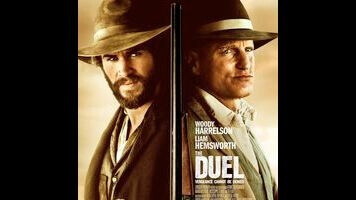Woody Harrelson must function like a battery for Liam Hemsworth. The live-wire American actor manages to bring his Aussie compatriot from the Hunger Games films briefly to life in The Duel, a hammy exploitation Western that shrouds its grungy intentions in arty window-dressing. The normally slumber-inducing and taciturn blankness of the younger Hemsworth brother gets put to good use under a bushy beard and minimal dialogue, and he rises (fitfully, it should be acknowledged) to the occasion when acting opposite Harrelson, who could likely make a kumquat seem an equal scene partner. Blessed with solid supporting character work and several scenes of genuine good fun, the movie manages to make its nearly two-hour run-time pass by easily enough, but not so much so that the seams on this patchwork quilt don’t still show.
Ironically, the lowbrow genre aspects of the picture are both the elements it tries to hide at first and also the most entertaining sequences by far. The story is pure pulp: It’s 1866, and bodies of Mexicans are turning up in a river on the Texas-Mexico border, leading the governor to dispatch Texas Ranger David Kingston (Hemsworth) to find out if Abraham Brant (Harrelson), the mysterious leader of a nearby town, is behind the potentially war-inciting murders. David goes undercover with his wife so as not to arouse suspicion, and the cat-and-mouse machinations begin almost immediately. The Freudian elements are in play from the get-go, as we know Abraham killed David’s father—in front of him as a boy, no less—and the Ranger’s wife (Alice Braga, not given much to work with) soon seems more comfortable with Abraham than her own husband. Much of the first half of the film is given over to the typical town-with-a-secret premise, as locals make strange warnings and Abraham makes David the new sheriff on what seems like little more than a whim. The best thing about these early goings is Harrelson, who digs into the messianic, Colonel Kurtz-like nature of his villain with oddball glee. (He’s even introduced in true Apocalypse Now form, shirtless and exercising in smoky shadows.)
But roughly halfway through The Duel, the audience learns what all the ponderous symbolism and portentous hints are about, and the reveal is pure exploitation-film cheese. The trashy twist actually threatens to take things in a more interesting direction, as the film briefly and sporadically makes lurid, campy fun out of brutal violence. Unfortunately, as with his first feature Wish You Were Here, director Kieran Darcy-Smith can’t quite sustain the mood of his rough-and-tumble Western between the sequences of grisly entertainment. He continually works (egged on by an uneven script) to turn this solid oater exercise into something stranger and more ethereal, but despite Harrelson’s game performance, the moments straining for eerie beauty only undercut the pacing, and by the time a perfunctory shoot-out between our opposing forces ushers in the final minutes, any tension has been sapped from the story. Attempting to transform predictable material into ambitious, unusual storytelling is always an admirable (and welcome) goal, but here, the tactic backfires: The unsubtle paces of a colorful genre yarn feel more inspired than the tortured drama.





























![Rob Reiner's son booked for murder amid homicide investigation [Updated]](https://img.pastemagazine.com/wp-content/avuploads/2025/12/15131025/MixCollage-15-Dec-2025-01-10-PM-9121.jpg)











